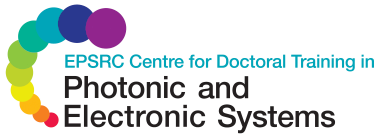Centre for Doctoral Training in Photonic and Electronic Systems
Two world-leading universities have joined forces to develop the next generation of researchers working on photonic and electronic systems that will change the way we live and work.
"If you really want to change the world, then study with us"
Prof Cyril Renaud, Programme Director
The Centre
University College London (UCL) and the University of Cambridge have combined their expertise to establish a Centre for Doctoral Training (CDT) in Photonic and Electronic Systems (PES).
We train postgraduate students using innovative teaching and learning techniques at two leading higher education institutions.
We work with over thirty companies and research organisations worldwide who support student projects and contribute to our doctoral training and research programme.
The programme
We offer an advanced four-year programme in Photonic and Electronic Systems which combines a one year Master of Research (MRes) followed by a three year Doctorate (PhD).
The programme is designed to provide students on the MRes with a solid grounding in photonics and the advanced research skills required to enable high quality PhD research.
How to apply
The Centre operates a three-stage application process.
Stage 1: Pre-application
- Prospective students should submit a Pre-Application form.
- Pre-applications are reviewed on an ongoing basis from November to May.
-
We recommend submitting a pre-application as early as possible. The application portals may close early if all places are filled.
Note: candidates who do not submit a pre-application may not be considered for the programme.
Stage 2: Interview
- Shortlisted candidates will be invited to interview. This may be at either pre-application or formal application stage.
- Interviews will take place monthly from November to May.
- Full applications from successful interviewees will be processed by the admisisons team at their chosen university.
Stage 3: Full application
- Candidates who are successful at pre-application will be invited to make a full application, before or after interview, to either UCL or University of Cambridge. The recruitment panel will advise shortlisted candidates which track to apply for: MRes only or MRes+PhD.
- Full applications are processed by the respective university.
Application closing dates
We are currently accepting pre-applications for entry to the programme in September 2026.
Pre-application screening and interviews: November to May each year.
Full applications close: May each year.
The application portal may close earlier than stated if the course becomes full, so we recommend you apply as early as possible.
Course start date: September 2026
Who should apply
We welcome applications from:
- UK graduates with a good first degree (1st or good 2:1) in a relevant science and/or engineering.
- EU and overseas students with equivalent qualifications.
- Applicants with relevant qualifications or industry experience who can demonstrate scientific or engineering research capability.
EPSRC funded studentships
UK/Home applicants
4-year fully funded EPSRC studentships (paying a stipend and fees) are available for UK/Home students who meet residency requirements. Home students who wish to enrol on the MRes only course will not be eligible for this studentship. See the APPLY page for details.
International applicants
We are unable to offer EPSRC-funded studentships for international students starting in October 2026. This is due to a change in the UK government funding provision for a single cohort starting in 2026/27, supporting only students with home fee status.
International applicants are advised to secure alternative funding, a scholarship or be able to self-fund before accepting a place on this programme.
Check the university websites for information relating to alternative funding sources and scholarships:
Funding for Overseas students - UCL
Funding for Overseas students - University of Cambridge
Equality and diversity
Both UCL and University of Cambridge are committed to promoting equality, diversity and inclusion in the recruitment, selection, education and assessment of students. We welcome applicants regardless of age, disability, gender identity, marriage or civil partnership status, pregnancy and maternity, race, religion or belief, sex or sexual orientation.
Diversity policy - University of Cambridge
The Centre for Doctoral Training in Connected Electronic and Photonic Systems (CEPS CDT) is funded by EPSRC grant ref: EP/S022139/1.
The Centre for Doctoral Training in Photonic and Electronic Systems (PES CDT) is funded by EPSRC grant ref: EP/Y034864/1.
